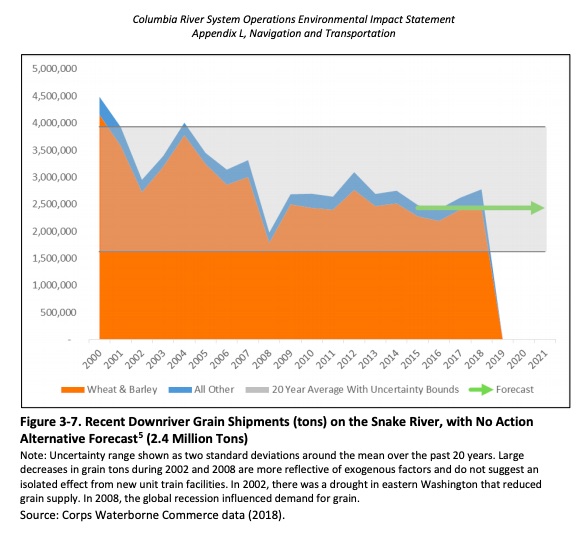forum
library
tutorial
contact

Dams Removal Will Have Devastating
Effects on Farmers,Rural Communities
by Staff
Idaho County Free Press, September 29, 2022
|
the film forum library tutorial contact |

|
Dams Removal Will Have Devastating
by Staff
|
A 'Critical Barge Shipping Route' says Columbia Grain International
 At a time of unprecedented supply chain disruption, inflation, severe logistical challenges, labor shortages, and the threat of food insecurity, Columbia Grain International (CGI) is concerned compromising waterways like the Columbia Snake River System will only result in further turmoil. CGI believes increased transportation costs, the loss of jobs, farmable land, and agricultural inputs, not to mention higher costs for farmers and consumers are imminent.
At a time of unprecedented supply chain disruption, inflation, severe logistical challenges, labor shortages, and the threat of food insecurity, Columbia Grain International (CGI) is concerned compromising waterways like the Columbia Snake River System will only result in further turmoil. CGI believes increased transportation costs, the loss of jobs, farmable land, and agricultural inputs, not to mention higher costs for farmers and consumers are imminent.
"We need to keep the lower Snake River dams. It's the top wheat export gateway in the nation and the third largest grain export corridor in the world," said the CGI CEO and president, Jeff Van Pevenage. "If farmers and the export industry in the Pacific Northwest lose this critical barge shipping route, there will further strain on an already broken supply chain."
The Snake River Dams support more than 60% of all wheat exports out of the Pacific Northwest area, or between 80 million bushels (mb) to 100 mb annually. According to the National Association of Wheat Growers, a single four-barge tow carrying wheat moves the equivalent of 538 semi-trucks and is the lowest cost shipping option. Removing the dams will likely lead to higher rail costs.
Statistics from the Pacific Northwest Waterways Association detail the problems that will result from shifting from barge to road in commodity crop transportation. Dam breaching is expected to require at least 201 additional unit trains and 23.8 million miles in additional trucking activity annually. The increased trucking activity will increase fuel costs, highway maintenance costs, terminal facility maintenance cost, driver time, and vehicle maintenance costs by more than $69 million per year. Switching from barge to rail and truck will increase CO2 and other harmful emissions by more than 1,251,000 tons per year. Highway, rail, grain elevators, and local infrastructure network will need more than $1 billion in capital investment. If breaching occurred and farm subsidies are not increased, devastating impacts could occur as 1,100 farms may be at risk of bankruptcy.
According to coverage in The Spokesman-Review, removing the dams would hike average transportation costs by 33%. The results are far reaching; farmers would have to cover these costs, jobs would be lost, agriculture output will drop, and consumer costs will rise.
Furthermore, farmable land acreage will decrease if the dams are breached as this land relies on irrigation from the river, meaning food production will go down and new irrigation systems will need to be strategized and implemented.
Additionally, removing the four giant hydroelectric dams on the lower Snake River would be expensive and finding other ways to provide electricity, irrigation and enabling commerce would cost between $10.3 billion and $27.2 billion.
"Hydroelectric dams, navigation locks, and salmon can and do coexist," said Van Pevenage. "The U.S. Army Corps of Engineers just released statistics for the year and we had the best sockeye salmon return on record at Bonneville and the highest return for sockeye to Lower Granite since 1962. We believe that there needs to be a solution that balances the needs of all stakeholders to address the many challenges to salmon throughout their lifecycle. Dam breaching is a simplistic and extreme concept that does not fully address the problem."
"The Columbia Snake River System has successfully served our communities for more than 40 years, providing our regions with clean power, jobs, efficient transportation, irrigation, flood control, and more," Van Pevenage continues. "We are committed to cultivating the continued growth of our farmers and our PNW communities to ensure the world continues to receive a steady flow of grains and pulses."
Related Pages:
Columbia Grain CEO: 'Cooler, Smarter Heads' Will Prevail on Snake River Dams by Matt Weaver, Capital Press, 8/22/22
learn more on topics covered in the film
see the video
read the script
learn the songs
discussion forum
